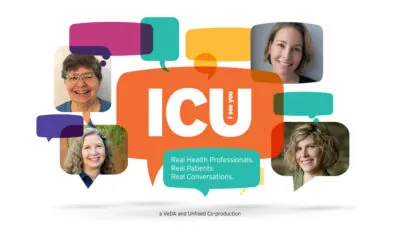
ICU – “I See You” Podcast
Managing Social Events With Dizziness and Imbalance
Listen Now
Available wherever you get your podcasts.
The year-end holidays are probably the busiest time of year for social events. Family gatherings and work parties, special church services, and cocktail parties with friends. These are meant to be fun and festive, a time to eat, drink, and be merry. But events can often be overwhelming for people with vestibular disorders, with bright lights and lots of people talking loudly and all at once. How can you take part in the joy of the season while also taking care of yourself? This episode of the ICU Podcast features a professional event planner whose job is to make large, busy events inclusive, as well as a vestibular patient who has developed a strategy for enjoying family gatherings.
About the Guests
Carol Rexroad Cannon lives with her husband Robert in Hendersonville, North Carolina. They worked together as United Methodist pastors for 35 years before retiring in 2021. Carol was struck with severe vertigo due to vestibular neuritis in 2016, which has since developed into PPPD. Vestibular rehab therapy has helped restore her balance. Carol enjoys hiking mountain trails near her home, visiting with family, and volunteering in the church and community to work for justice, peace, and wholeness.
Erika LaDousa has over 20 years of event planning experience, nine of those as the owner of LDS Events, an event planning company that focuses solely on supporting non-profit organizations. Erika also works as a fundraising consultant with Minneapolis-based Fladeboe Advancement. Erika lives in Edina, Minnesota, with her husband and two daughters. She loves to travel, volunteer, and spend time at their family cabin in Wisconsin.
Hosts
Cynthia Ryan, Executive Director of the Vestibular Disorders Association (VeDA)
Kimberly Warner, Founder and Director of Unfixed Media.
This podcast is a co-production of the Vestibular Disorders Association (VeDA) and Unfixed Media.
Summary
The latest episode of the ICU Podcast explores the challenges of social gatherings for individuals with vestibular disorders, offering valuable insights, practical strategies, and hope for those who struggle with sensory overload during holiday events and social interactions.
Hosts Cynthia Ryan and Kimberly Warner delve into the intricate world of social events through conversations with two remarkable guests: Carol Rexroad Cannon, a vestibular patient, and Erica Laddusa, a professional event planner. Their discussion highlights the often-overlooked challenges faced by individuals with vestibular disorders and offers practical guidance for both patients and event organizers.
The podcast highlights the various challenges that vestibular patients encounter during social events. Bright lights, loud conversations, crowded spaces, and constant stimuli can quickly become overwhelming.
Carol Rexroad Cannon’s vestibular journey began in 2016 with a sudden onset of vertigo that dramatically altered her life. Initially overwhelmed by symptoms like dizziness, nausea, and sensory sensitivity, she underwent extensive vestibular rehabilitation therapy. Her experience highlights the profound impact of vestibular disorders on daily life, particularly in social settings. Carol candidly shares her experiences, including a memorable moment at a family wedding where she was so overstimulated that she sobbed uncontrollably in the middle of the reception.
Carol’s checklist for family gatherings includes practical tips like:
- Limiting guest stay duration
- Preparing meals in advance
- Having a retreat space nearby
- Allowing yourself to take necessary breaks
- Choosing strategic seating locations
Event planner Erica Laddusa brings a professional perspective to accessibility and inclusion. She notes a growing trend in event planning to create more accommodating environments. This includes providing quiet spaces, offering hybrid event options, reducing program lengths, and implementing features like closed captioning and sensory-friendly modifications. The conversation provides several practical strategies for managing social events:
- Plan Ahead: Communicate with event organizers about specific needs and potential accommodations.
- Set Boundaries: Have a predetermined exit strategy and a support person who understands your limitations.
- Know Your Purpose: Attend events with a clear, manageable goal, whether it’s seeing a specific person or staying for a short time.
- Practice Self-Compassion: Celebrate small victories and be gentle with yourself.
Erica emphasizes that most event planners are eager to help and want to create inclusive experiences. She encourages individuals to reach out and communicate their needs, noting that many accommodations can be made with simple adjustments.
The podcast also addresses the emotional toll of vestibular disorders. Both guests acknowledge the sadness that can come with feeling limited, but they stress the importance of focusing on what one can do rather than what one cannot. A compelling moment comes when Carol advises listeners to “be gentle on yourself” and to celebrate even the smallest achievements. Her message of hope resonates: vestibular disorders may present challenges, but they need not define or limit one’s life completely.
The conversation concludes with a vision of more inclusive events and a hope for continued understanding and accommodation for those with vestibular and other invisible disorders. For patients feeling isolated or overwhelmed, the podcast offers a message of solidarity and practical guidance. For event organizers and family members, it provides valuable insights into creating more welcoming and accessible environments. As the hosts note, understanding and compassion can transform social experiences from sources of anxiety to opportunities for connection and joy.
A full transcript is available on YouTube (scroll below the description and click “Show Transcript”).
